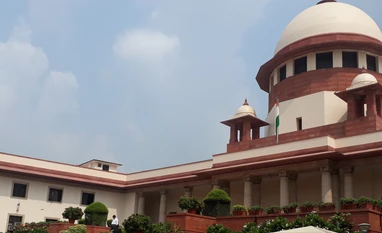Unsecured lenders' dues to be prioritised over govt's: Supreme Court
IBC will override the provisions of the Electricity Act, 2003, says bench
)
Supreme Court
Listen to This Article
The Supreme Court said on Monday dues of unsecured lenders would be prioritised over those owed to the government, citing the 'waterfall mechanism' in the Insolvency and Bankruptcy Code (IBC) of 2016.
In doing so, a bench of Justices S Ravindra Bhat and Dipankar Datta ruled that the IBC will override the provisions of the Electricity Act, 2003.
Section 238 of IBC says the provisions of the code shall have effect, notwithstanding anything inconsistent therewith contained in any other law.
The Paschimanchal Vidyut Vitran Nigam Limited (PVVNL) had moved the National Company Law Appellate Tribunal (NCLAT) after the National Company Law Tribunal in Allahabad set aside an attachment of the property of Raman Ispat Pvt. Ltd. (borrower) over electricity charge dues to PVVNL. The NCLAT held that PVVNL can recover its dues under the liquidation process as per the IBC. PVVNL then approached the Supreme Court which dismissed the appeal.
The court dealt with a specific question of law as to whether the dues accruing to a Distribution Licensee (“DISCOM/Power Distribution Utility”) can be recovered in terms of the mechanism envisaged under the Electricity Act, 2003 and the UPERC Electricity Supply Code, 2005 and accordingly override the liquidation proceedings and the waterfall mechanism of repayment of dues as provided under the IBC.
Also Read
The court observed that the mechanism for recovery of the outstanding electricity dues as per the Electricity Act and the Supply Code cannot subsist in view of pendency of insolvency or liquidation proceedings of the borrower due to the benefit of moratorium period extended to the Corporate Debtor under IBC.
"The judgement once again cements the established position of law which moots for the primacy of the IBC over other statutes. While doing so it clearly opines those provisions of the Electricity Act 2003 and its allied regulations cannot override the non-obstante clause under Section 238 of the IBC," said Tabrez Malawat, partner at The Guild.
PVVNL had argued before the apex court that the Electricity Act is a special enactment, and would prevail over the IBC. It relied on the State Tax Officer versus Rainbow Papers Ltd judgment, in which the Supreme Court held that a resolution plan which rejects statutory dues payable to State government or any legal authority altogether, is liable to be rejected.
On the other hand, the borrower argued that the provisions of the IBC would prevail over any other Act.
The court, rejecting PVVNL's arguments, said that the judgment in Rainbow Papers did not notice the ‘waterfall mechanism’ under Section 53 of the IBC. Moreover, Rainbow Papers case dealt with the resolution process and not liquidation process, said the court.
"The careful design of Section 53 locates amounts payable to secured creditors and workmen at the second place, after the costs and expenses of the liquidator payable during the liquidation proceedings. However, the dues payable to the government are placed much below those of secured creditors and even unsecured and operational creditors. This design was either not brought to the notice of the court in Rainbow Papers (supra) or was missed altogether. In any event, the judgment has not taken note of the provisions of the IBC which treat the dues payable to secured creditors at a higher footing than dues payable to Central or State Government," the court held.
"This is a great sigh of relief for various ongoing NCLT matters, whereby, the Resolution Applicants were compelled to abide by Rainbow Papers Judgment which resulted in timelines under the Code being vitiated," said Amir Bavani, founder, AB Legal in Hyderabad.
More From This Section
Topics : IBC Supreme Court Electricity Act
Don't miss the most important news and views of the day. Get them on our Telegram channel
First Published: Jul 18 2023 | 7:19 PM IST


